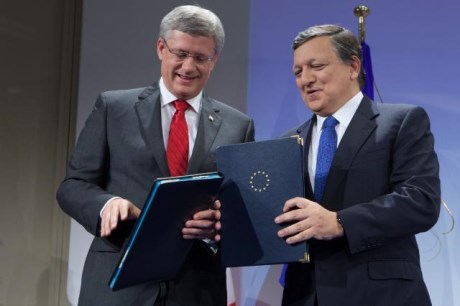A comprehensive trade accord agreed in principle between Canada and the European Union (EU) will ease restrictions on European investment in Canada, including in the uranium mining sector.
 |
| Canadian president Stephen Harper and European Commission president Manuel Barroso celebrate the agreement (Image: European Commission) |
Described by Canadian prime minister Stephen Harper as the "biggest, most ambitious trade agreement that Canada has ever reached," the Comprehensive Economic and Trade Agreement (CETA) will be the first free trade agreement between the EU and a G8 country. It will remove over 99% of tariffs between the two economies and create new market access opportunities for both sides. Overall, the wide-ranging agreement is expected to bolster the EU's GDP by around €12 billion ($16.5 billion) per year.
Canadian provinces have been involved from the outset in the negotiations leading to the new agreement. Saskatchewan, home to Canada's uranium mining industry, was involved in the push to ease restrictions on uranium mining investments. In a statement, Saskatchewan premier Brad Wall said that the changes would make Saskatchewan's uranium mining projects "much more attractive" to EU investors as well as creating more economic opportunities for the region. Wall estimated that the province could see investments of up to CAD 2.5 billion ($2.4 billion) over the next 15 years as a result of the agreement.
Now that political agreement has been reached on the key elements of the CETA, negotiators will continue to work to settle all the remaining technical issues, after which the formal agreement will need to be approved, signed and ratified by the respective parliaments.
Researched and written
by World Nuclear News






_15863.jpg)







